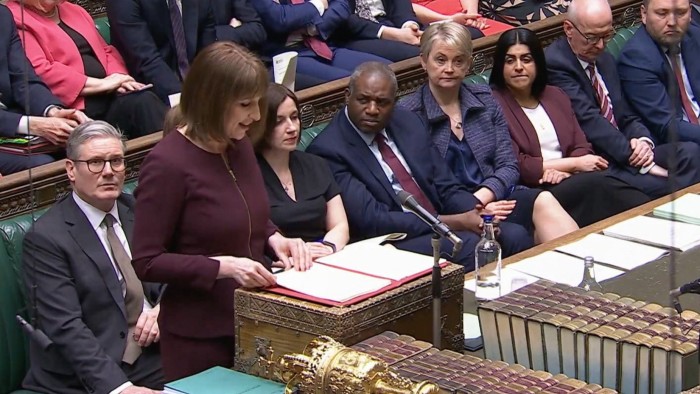Unlock the Editor’s Digest for free
Roula Khalaf, Editor of the FT, selects her favourite stories in this weekly newsletter.
Rachel Reeves has announced a £14bn package to repair the UK public finances after weak economic growth and high borrowing costs hit the country’s fiscal position just five months after her first Budget in October.
Welfare cuts will save a net £3.4bn, according to modelling by the Office for Budget Responsibility, Reeves said, as she aims to meet her fiscal rules, which she described early in her statement as “non-negotiable”.
She also announced cuts to day-to-day departmental spending of £3.6bn by 2029-30.
The chancellor added that, because of her changes, the government’s “headroom” — its fiscal room for manoeuvre — would reach £9.9bn in 2029-30, the same level that had been predicted in October.
Tax compliance measures are also forecast to raise £2.2bn by 2029-30, while an expected boost in GDP from planning reforms should reduce borrowing by a further £3.4bn by that time.
While capital spending is set to increase, this does not affect Reeves’ main fiscal rule, which focuses on day-to-day spending.
The Spring Statement is a response to a new set of forecasts from the OBR, the UK’s fiscal watchdog, which Reeves confirmed had put her £4.1bn in the red against her fiscal rule. She added that the OBR had revised its 2025 growth forecast to 1 per cent, far below its previous estimate of 2 per cent.
The chancellor confirmed there would be no tax rises and that defence spending would increase to 2.5 per cent of GDP.
The Spring Statement came ahead of the implementation next month of a major increase in employer national insurance contributions, announced in Reeves’ first Budget in October.
The measure is set to raise £23.8bn in the 2025-26 fiscal year, rising to £25.7bn in 2029-30. It comes alongside tax increases that have already been implemented, including the imposition of VAT on private school fees that came into force in January.
The chancellor is also phasing in a swath of other tax-raising measures, including capital gains tax and inheritance tax on agricultural and business property.


